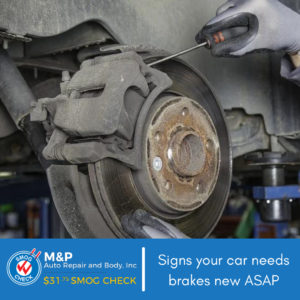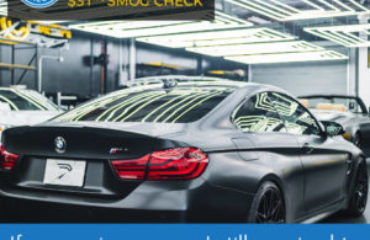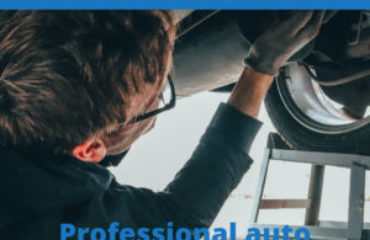Brake pad wear is one of the most common causes of a rough or jerky braking sensation, which can be an indication that your brakes need to be replaced. Your brakes should also make noise when you apply them and if they don’t, it could mean that there’s a problem with the pads themselves.
Finally, if you experience any vibration when applying the brake pedal, it may be time to change your pads.
Identifying one of the signs below is a good indication that your car needs new brakes. Keep in mind that brake pads are not inexpensive, so it’s best to get them changed sooner rather than later.
 4 signs that your brake pads are wearing out
4 signs that your brake pads are wearing out
- Discoloration: The brake pads and braking system should be a uniform color. If the brakes are discolored, it may be an indication that they need to be changed.
- Jerky braking: A jerky braking sensation is often an indication that the brake pad is wearing out and needs to be replaced.
- Squeal: A squeal indicates that you’re not getting enough friction surface with the brakes. This is most likely due to your brake pads wearing out or too much dirt on them.
- Vibration: This is most likely caused by your brake pads wearing out or having too much dirt on them.
It’s important to always pay attention to any sudden changes that you might feel when braking, as it can be a sign that you’re nearing the end of your warranty period. If you notice any of the following issues with your brakes, you might need to get them replaced sooner rather than later. If your brake pads are worn out, they may be the cause of a few different symptoms that can affect your driving.
Brake pads do not last forever and eventually need to be changed.
If your brakes feel rough when you brake, it might be an indication that your pads are wearing out. This can also happen if the brakes pull to one side or the other when you apply them. You can also check for discoloration to judge how much use your brake pads have been through from heavy wear and tear. If your braking system is discolored, it’s a good idea to get new brake pads before they completely wear out.
If your brakes are squealing, it’s usually an indication that you’re not getting enough friction surface with the brake pads. This could also be due to having too much dirt on them or simply being worn out. If your car is experiencing vibrations when you apply the gas pedal, this can be another indication that you need new brake pads.
The vibration may not be noticeable until you come close to the end of your warranty period. If you notice that your car shakes, shudders, or vibrates when braking, it’s probably time to change your brake pads. This is especially true if these symptoms occur after turning your wheels and apply even more so on a hill or slippery surfaces.
Brake problems.
Brake pads are a one-time purchase for most vehicles. They should not need to be replaced more than twice in the life of the car. However, they do need to be replaced when they have worn down too much. Brake pads are necessary for your car’s braking system to work properly.
Brake pads do not work equally on all types of terrain. For example, dry surfaces will wear out brake pads quickly since they don’t provide enough resistance for the brakes to grip and stop the vehicle. Wet surfaces will also cause brake pads to wear out quickly because water restricts friction and prevents them from gripping on the ground as well as they would on dry surfaces.
When the brake pads start wearing out, it can cause audible squealing noise. It’s very noticeable when braking but it can also occur while accelerating or turning the steering wheel. This kind of noise is usually an indicator that your brake pads are wearing out and need to be changed.
When it’s time to change your brake pad?
When it’s time to change your brake pad, you’ll start to notice signs of wear like an audible squealing noise when braking.
You should also check for any discoloration on the brakes or the brake system. If the brakes are discolored it’s a good indication that they need to be replaced. You should also keep track of how your car feels while braking. If the car shakes, shudders, or vibrates when braking, it could indicate that there is a problem with your pads and they need to be replaced soon.
When your car’s brake pads wear down, it can cause an audible squealing noise when braking. You should also check for any discoloration on the brakes or the brake system if you suspect there may be a problem with them. Lastly, keep track of how your car feels when you brake so if it shakes, shudders, or vibrates while braking, know that there may be an issue with the pads.
7 reasons why you should invest in high-quality brake pads.
- If your brake pads are just worn out from extensive use, you may have a few intermittent signs that mean it’s time for a change, but you’re not sure if fully replace them just yet. In this situation, the best thing to do is follow your intuition and get a new set to be safe.
- Car brake pads wear down very quickly when they’re used on wet surfaces. This can lead to your car feeling like it’s shaking or shuddering when you apply the brakes which could make them dangerous. You should replace your brake pads if they start wearing down because of the conditions they’re being used in.
- Brake pads are crucial for proper braking and without them you could end up with a faulty braking system. If they’re damaged, you might notice the vehicle shaking or vibrating when you apply the brakes which can be a very dangerous situation on wet roads and in bad weather conditions.
- When your car’s brake pads are worn down to less than one-third of their original thickness it will cause them to squeal every time you apply the brakes. This is a very obvious sign that they need to be replaced soon for your own safety and the safety of those around you.
- If you’re having a hard time stopping your vehicle, it could mean that your brake pads are worn down too much which means it’s time for them to go. You should replace them before you start to see any other signs that they’re wearing down.
- You should replace your brake pads when they begin to show visible signs of wear and tear like cracks in the surface. They should also be checked for damage every time you take your car in for servicing, which is usually around 30,000 kilometres or two years. For some cars, this can be as early as 15,000 kilometres or one year.
- If you have a new set of brake pads you should always ensure that they’re properly seated. To do this, turn the wheels until your car’s front wheel are facing directly forward and then push on the brakes for one or two seconds while slowly applying the accelerator. If the car moves forward, your brakes haven’t been properly seated and you should do it again until they are.
Are your breaks trying to tell you something?
If you’ve been experimented some of this sings with your car, your breaks need professional attention, so don’t wait!. At M&P Auto Repair & Smog Check Inc. we take care of your car. Just give us a call at 562-218-1280.


